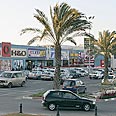
End to shopping spree"
צילום: מאיר פרטוש
Banning work on Saturdays angers kibbutzim
Anger rises in Kibbutz Movement after National Labor Court decides to forbid work in kibbutzim on Saturdays. Movement calls it 'hard blow to workers' livelihood'
A verdict received Tuesday in the National Labor Court saying kibbutz members are forbidden to open businesses on Saturdays caused great anger in the Kibbutz Movement.
The Movement's heads Gavri Bargil and Ze'ev Shor said Wednesday morning that this is a hard blow to thousands of small businesses in the periphery, and to the income of tens of thousands of workers including kibbutz members.
"The fact that the Court took it upon itself to decide 'who is Jewish' is beyond us. Our jewishness and our lifestyle are secular, and will not be determined by the silly criterion of working on Saturday." The two said.
The Kibbutz Movements representatives said that the verdict will not stand the test of reality, since the Saturday shoppers come of their own free will, and so do the employees. "This verdict harms Israel's status as a free country," they claimed.
The first victims to be effected by this verdict are the small business owners. This will affect about 1,800 small businesses. The Kibbutz Movement's spokesman Aviv Leshem gave an example of a painter in the far periphery who can no longer sell her paintings on Saturdays.
Avraham Shafri, a kibbutz store owner explained that people on the kibbutz "have to take care of themselves, like anywhere else. But unlike everywhere else, most kibbutzim are located in the far periphery – they don’t get loads of people, and Saturdays are an important and vital stream of income."
On the other hand, Emunah – the National Religious Women's Organization was pleased with the verdict and said that a Saturday without trade is a "net profit" for the family.
The organization's head Liora Minka said: "Now the register will be registering greater and much more significant profits for the Jewish family. Those who supposedly fight for free trade on the day of rest are actually slave traders. The labor law of rest and work hours is a socialistic value, and this is what the court was trying to convey."
Court decides 'Who's Jewish'
The National Labor Court's panel, led by Elisheva Barak, decided that indictments can be filed against kibbutzim for trading on Saturdays.This decision overturned a previous decision made by a regional court in which it rejected an indictment filed against a kibbutz for operating a clothing and artwork stores, owned by Jewish kibbutz members.
The regional court acquitted the kibbutz with the claim that the religion of a cooperative society (a kibbutz) cannot be determined, and therefore neither can its legal day of rest.
Despite this, the State's appeal to the verdict was granted following its arguments that "the legislature's aim was to apply the banning (of work on Saturdays) not only to the employees, but to businesses in general and to cooperative societies specifically…. The verdict that said that the cooperative society's religion can't be determined should not be accepted. Its judicial knowledge that a kibbutz is Jewish."
Yael Branovsky contributed to this story










